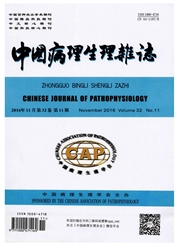

 中文摘要:
中文摘要:
目的:探讨妊娠浓度雌激素(E2)、孕激素(P4)对小鼠H-Y皮肤移植的影响及其机制。方法:建立小鼠去势模型,每天分别注射E2、P4及E2+P4联合注射,14 d后受鼠行H-Y皮肤移植并继续给药。检测移植前及移植后72 h外周血CD4+CD25+Foxp3+调节性T细胞(Treg)变化及外周血细胞因子水平;观察H-Y皮肤移植物的存活情况。结果:E2可提高外周血Treg的比例(P〈0.05),移植后Treg的比例进一步升高(P〈0.05);P4对Treg没有显著影响(P〉0.05),而E2+P4联合对Treg的影响与单独应用E2结果相似(P〉0.05)。移植后P4对Treg仍无明显影响(P〉0.05),而E2+P4联合亦不能进一步提高Treg的比例。细胞因子检测显示,E2、P4均能减少促炎因子分泌,并提高抗炎因子分泌(P〈0.05)。两者均能有效延长H-Y皮肤移植物存活(P〈0.05),且具有协同效应。结论:P4可通过诱导免疫偏移促进H-Y皮肤移植物的存活。而E2除诱导免疫偏移外,还通过提高Treg水平而延长移植物的存活时间。
 英文摘要:
英文摘要:
AIM: To investigate the effect of estrogen(E2) and progesterone(P4) alone or applied together to H-Y skin graft and the potential mechanism.METHODS: The female C57BL/6 mice were ovariectomized and divided into four groups(n=12 in each).The mice were treated consecutively for 14 d with subcutaneous injection of saline,E2 and P4 alone or in combination,respectively.Before and after H-Y skin grafting,half mice of each group were sacrificed,and the CD4+CD25+Foxp3+ regulatory T cells of peripheral blood and the serum cytokines were detected by flow cytometry and ELISA,respectively.The skin graft survivals of the other half were observed.RESULTS: E2 alone could significantly augment the proportion of regulatory T cells.In the presence of H-Y antigen,this effect was further enhanced(P0.05).By contrast,P4 had no effect on the expression of Foxp3,regardless of the presence of H-Y antigen or not(P0.05).The effect of E2 in combination with P4 was similar to that of E2 alone(P0.05).The administration of sex hormone regardless of E2 and P4 alone or in combination,significantly decreased production of pro-inflammatory cytokines,but increased production of anti-inflammatory cytokines(P0.05).The skin graft survivals were significantly prolonged in the different experimental groups compared to vehicle control group.E2 and P4 had a synergistic effect to prolong the skin graft survivals(P0.05).CONCLUSION: E2 and P4 suppress the inflammatory response and enhance the regulatory response to exogenous antigen,through influencing the levels of cytokines and/or the proportion of regulatory T cells,which may contribute to induce the transplant tolerance.
 同期刊论文项目
同期刊论文项目
 同项目期刊论文
同项目期刊论文
 期刊信息
期刊信息
